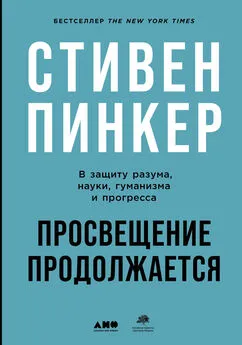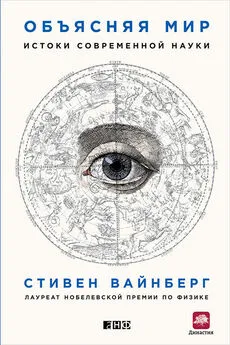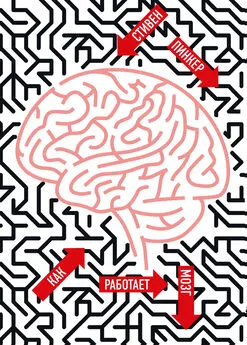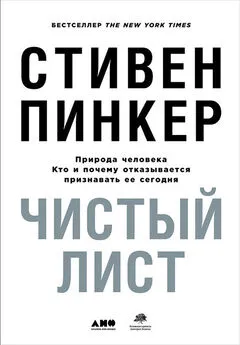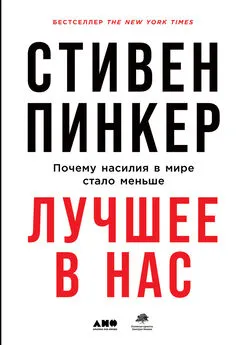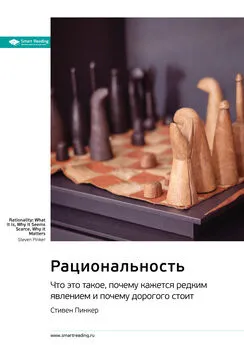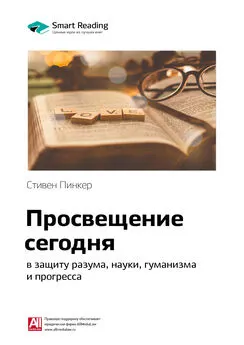Стивен Пинкер - Просвещение продолжается. В защиту разума, науки, гуманизма и прогресса
- Название:Просвещение продолжается. В защиту разума, науки, гуманизма и прогресса
- Автор:
- Жанр:
- Издательство:Альпина нон-фикшн
- Год:2021
- Город:Москва
- ISBN:9785001395362
- Рейтинг:
- Избранное:Добавить в избранное
-
Отзывы:
-
Ваша оценка:
Стивен Пинкер - Просвещение продолжается. В защиту разума, науки, гуманизма и прогресса краткое содержание
Этот прогресс – не случайность и не результат действия внешних сил. Это дар современному миру от деятелей Просвещения, которые первыми додумались, что знания можно использовать во имя процветания всего человечества. Идеи Просвещения – вовсе не наивные мечтания. Наоборот, они сработали – и это неоспоримый факт. Тем не менее именно сейчас эти идеи особенно нуждаются в нашей защите, поскольку противостоят характерным недостаткам человеческой природы – трайбализму, авторитаризму, демонизации чужаков и магическому мышлению, – которые так нравится эксплуатировать современным демагогам. Да, стоящие перед человечеством проблемы огромны, но все они решаемы, если мы, продолжая дело Просвещения, используем для этого разум, доверяем науке и руководствуемся идеалами гуманизма.
Особенности
Более 70 графиков из почти всех областей человеческой жизни.
Для кого
Для поклонников Стивена Пинкера. Для всех, кто интересуется природой человека. Для тех, кто верит в прогресс, и для тех, кто в нем сомневается.
Просвещение продолжается. В защиту разума, науки, гуманизма и прогресса - читать онлайн бесплатно ознакомительный отрывок
Интервал:
Закладка:
Meyer, B. D., & Sullivan, J. X. 2016. Consumption and income inequality in the U.S. since the 1960s. NBER Working Paper 23655. https://www3.nd.edu/~jsulliv4/Inequality3.6.pdf.
Meyer, B. D., & Sullivan, J. X. 2017. Annual report on U.S. consumption poverty. http://www.aei.org/publication/annual-report-on-us-consumption-poverty-2016/.
Michel, J.-B., Shen, Y. K., Aiden, A. P., Veres, A., Gray, M. K., The Google Books Team, Pickett, J. P., Hoiberg, D., Clancy, D., Norvig, P., Orwant, J., Pinker, S., Nowak, M., & Lieberman-Aiden, E. 2010. Quantitative analysis of culture using millions of digitized books. Science, 331, 167–82.
Milanović, B. 2012. Global income inequality by the numbers: In history and now – an overview . Washington: World Bank Development Research Group.
Milanović, B. 2016. Global inequality: A new approach for the age of globalization . Cambridge, MA: Harvard University Press.
Miller, M., Azrael, D., & Barber, C. 2012. Suicide mortality in the United States: The importance of attending to method in understanding population-level disparities in the burden of suicide. Annual Review of Public Health, 33, 393–408.
Miller, R. A., & Albert, K. 2015. If it leads, it bleeds (and if it bleeds, it leads): Media coverage and fatalities in militarized interstate disputes. Political Communication, 32, 61–82.
Miller, T. R., Lawrence, B. A., Carlson, N. N., Hendrie, D., Randall, S., et al. 2016. Perils of police action: A cautionary tale from US data sets. Injury Prevention .
Moatsos, M., Baten, J., Foldvari, P., van Leeuwen, B., & van Zanden, J. L. 2014. Income inequality since 1820. In J. van Zanden, J. Baten, M. M. d’Ercole, A. Rijpma, C. Smith, & M. Timmer, eds., How was life? Global well-being since 1820 . Paris: OECD Publishing.
Mokyr, J. 2012. The enlightened economy: An economic history of Britain, 1700–1850 . New Haven: Yale University Press.
Mokyr, J. 2014. Secular stagnation? Not in your life. In C. Teulings & R. Baldwin, eds., Secular stagnation: Facts, causes and cures . London: Centre for Economic Policy Research.
Montgomery, S. L., & Chirot, D. 2015. The shape of the new: Four big ideas and how they made the modern world . Princeton, NJ: Princeton University Press.
Mooney, C. 2005. The Republican war on science . New York: Basic Books.
Morewedge, C. K., Yoon, H., Scopelliti, I., Symborski, C. W., Korris, J. H., et al. 2015. Debiasing decision making with a single training intervention. Policy Insights from the avioral and Brain Sciences, 2, 129–40.
Morton, O. 2015. The planet remade: How geoengineering could change the world . Princeton, NJ: Princeton University Press.
Moss, J. 2005. The 482nd convocation address: Could Morton do it today? University of Chicago Record, 40, 27–28.
Mozgovoi, A. 2002. Recollections of Vadim Orlov (USSR submarine B 9). The Cuban Samba of the Quartet of Foxtrots: Soviet submarines in the Caribbean crisis of 1962 . http://nsarchive.gwu.edu/nsa/cuba_mis_cri/020000%20Recollections%20of%20Vadim%20Orlov.pdf.
Mueller, J. 1989. Retreat from doomsday: The obsolescence of major war . New York: Basic Books.
Mueller, J. 1999. Capitalism, democracy, and Ralph’s Pretty Good Grocery . Princeton, NJ: Princeton University Press.
Mueller, J. 2004a. The remnants of war . Ithaca, NY: Cornell University Press.
Mueller, J. 2004b. Why isn’t there more violence? Security Studies, 13, 191–203.
Mueller, J. 2006. Overblown: How politicians and the terrorism industry inflate national security threats, and why we believe them . New York: Free Press.
Mueller, J. 2009. War has almost ceased to exist: An assessment. Political Science Quarterly, 124, 297B–321.
Mueller, J. 2010a. Atomic obsession: Nuclear alarmism from Hiroshima to Al-Qaeda . New York: Oxford University Press.
Mueller, J. 2010b. Capitalism, peace, and the historical movement of ideas. International Interactions, 36, 169–84.
Mueller, J. 2012. Terror predictions. http://politicalscience.osu.edu/faculty/jmueller/PREDICT.pdf.
Mueller, J. 2014. Did history end? Assessing the Fukuyama thesis. Political Science Quarterly, 129, 35–54.
Mueller, J. 2016. Embracing threatlessness: US military spending, Newt Gingrich, and the Costa Rica option. https://politicalscience.osu.edu/faculty/jmueller/CNArestraintCato16.pdf.
Mueller, J., & Friedman, B. 2014. The cyberskeptics. https://www.cato.org/research/cyberskeptics.
Mueller, J., & Stewart, M. G. 2010. Hardly existential: Thinking rationally about terrorism. Foreign Affairs, April 2.
Mueller, J., & Stewart, M. G. 2016a. Chasing ghosts: The policing of terrorism . New York: Oxford University Press.
Mueller, J., & Stewart, M. G. 2016b. Conflating terrorism and insurgency. Lawfare . https://www.lawfareblog.com/conflating-terrorism-and-insurgency.
Muggah, R. 2015. Fixing fragile cities. Foreign Affairs, Jan. 15.
Muggah, R. 2016. Terrorism is on the rise – but there’s a bigger threat we’re not talking about. World Economic Forum Global Agenda . https://www.weforum.org/agenda/2016/04/terrorism-is-on-the-rise-but-there-s-a-bigger-threat-we-re-not-talking-about/.
Muggah, R., & Szabo de Carvalho, I. 2016. The end of homicide. Foreign Affairs, Sept. 7.
Müller, J.-W. 2016. What is populism? Philadelphia: University of Pennsylvania Press.
Müller, V. C., & Bostrom, N. 2014. Future progress in artificial intelligence: A survey of expert opinion. In V. C. Müller, ed., Fundamental issues of artificial intelligence . New York: Springer.
Mulligan, C. B., Gil, R., & Sala-i-Martin, X. 2004. Do democracies have different public policies than nondemocracies? Journal of Economic Perspectives, 18 , 51–74.
Munck, G. L., & Verkuilen, J. 2002. Conceptualizing and measuring democracy: Evaluating alternative indices. Comparative Political Studies, 35, 5–34.
Murphy, J. M., Laird, N. M., Monson, R. R., Sobol, A. M., & Leighton, A. H. 2000. A 40-year perspective on the prevalence of depression: The Stirling County study. Archives of General Psychiatry, 57 .
Murphy, J. P. M. 1999. Hitler was not an atheist. Free Inquiry, 9.
Murphy, S. K., Zeng, M., & Herzon, S. B. 2017. A modular and enantioselective synthesis of the pleuromutilin antibiotics. Science, 356, 956–59.
Murray, C. 2003. Human accomplishment: The pursuit of excellence in the arts and sciences, 800 B.C. to 1950. New York: HarperPerennial.
Murray, C. J. L., et al. (487 coauthors). 2012. Disability djusted life years (DALYs) for 291 diseases and injuries in 21 regions, 1990–2010: A systematic analysis for the Global Burden of Disease study 2010. The Lancet, 380, 2197–2223.
Musolino, J. 2015. The soul fallacy: What science shows we gain from letting go of our soul beliefs . Amherst, NY: Prometheus Books.
Myhrvold, N. 2014. Commentary on Jaron Lanier’s “The myth of AI.” Edge . https://www.edge.org/conversation/jaron_lanier-the-myth-of-ai#25983.
Naam, R. 2010. Top five reasons “the singularity” is a misnomer. Humanity+ . http://hplusmagazine.com/2010/11/11/top-five-reasons-singularity-misnomer/.
Naam, R. 2013. The infinite resource: The power of ideas on a finite planet . Lebanon, NH: University Press of New England.
Nadelmann, E. A. 1990. Global prohibition regimes: The evolution of norms in international society. International Organization, 44, 479–526.
Nagdy, M., & Roser, M. 2016a. Military spending. Our World in Data . https://ourworldindata.org/military-spending/.
Nagdy, M., & Roser, M. 2016b. Optimism and pessimism. Our World in Data . https://ourworldindata.org/optimism-pessimism/.
Nagdy, M., & Roser, M. 2016c. Projections of future education. Our World in Data . https://ourworldindata.org/projections-of-future-education/.
Nagel, T. 1970. The possibility of altruism . Princeton, NJ: Princeton University Press.
Nagel, T. 1974. What is it like to be a bat? Philosophical Review, 83, 435–50.
Nagel, T. 1997. The last word . New York: Oxford University Press.
Nagel, T. 2012. Mind and cosmos: Why the materialist neo arwinian conception of nature is almost certainly false . New York: Oxford University Press.
Nash, G. H. 2009. Reappraising the right: The past and future of American conservatism . Wilmington, DE: Intercollegiate Studies Institute.
National Assessment of Adult Literacy. (Undated.) Literacy from 1870 to 1979. https://nces.ed.gov/naal/lit_history.asp.
National Center for Health Statistics. 2014. Health, United States, 2013 . Hyattsville, MD: National Center for Health Statistics.
National Center for Statistics and Analysis. 1995. Traffic safety facts 1995–pedestrians . Washington: National Highway Traffic Safety Administration. https://crashstats.nhtsa.dot.gov/Api/Public/ViewPublication/95F9.
National Center for Statistics and Analysis. 2006. Pedestrians: 2005 data . Washington: National Highway Traffic Safety Administration. https://crashstats.nhtsa.dot.gov/Api/Public/ViewPublication/810624.
National Center for Statistics and Analysis. 2016. Pedestrians: 2014 data. Washington: National Highway Traffic Safety Administration. https://crashstats.nhtsa.dot.gov/Api/Public/ViewPublication/812270.
National Center for Statistics and Analysis. 2017. Pedestrians: 2015 data . Washington: National High-way Traffic Safety Administration. https://crashstats.nhtsa.dot.gov/Api/Public/Publication/812375.
National Consortium for the Study of Terrorism and Responses to Terrorism. 2016. Global Terrorism Database. https://www.start.umd.edu/gtd/.
National Institute on Drug Abuse. 2016. DrugFacts: High school and youth trends. https://www.drugabuse.gov/publications/drugfacts/high-school-youth-trends.
National Safety Council. 2011. Injury facts, 2011 edition . Itasca, IL: National Safety Council.
National Safety Council. 2016. Injury facts, 2016 edition . Itasca, IL: National Safety Council.
Nemirow, J., Krasnow, M., Howard, R., & Pinker, S. 2016. Ineffective charitable altruism suggests adaptations for partner choice. Presented at the Annual Meeting of the Human Behavior and Evolution Society, Vancouver. New York Times . 2016. Election 2016: Exit polls. https://www.nytimes.com/interactive/2016/11/08/us/politics/election-exit-polls.html?r=0.
Newman, M. E. J. 2005. Power laws, Pareto distributions and Zipf’s law. Contemporary Physics, 46, 323–51.
Nietzsche, F. 1887/2014. On the genealogy of morals . New York: Penguin.
Nisbet, R. 1980/2009. History of the idea of progress . New Brunswick, NJ: Transaction.
Norberg, J. 2016. Progress: Ten reasons to look forward to the future . London: Oneworld.
Nordhaus, T. 2016. Back from the energy future: What decades of failed forecasts say about clean energy and climate change. Foreign Affairs, Oct. 18.
Nordhaus, T., & Lovering, J. 2016. Does climate policy matter? Evaluating the efficacy of emissions caps and targets around the world. The Breakthrough . http://thebreakthrough.org/issues/Climate-olicy/does-climate-policy-matter.
Nordhaus, T., & Shellenberger, M. 2007. Break through: From the death of environmentalism to the politics of possibility . Boston: Houghton Mifflin.
Читать дальшеИнтервал:
Закладка:
